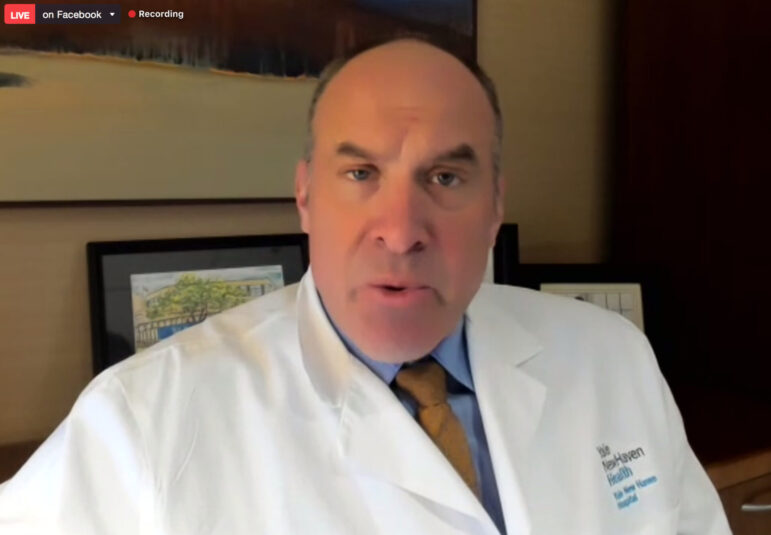This week at a Yale New Haven Health System press conference, Chief Medical Officer Dr. Tom Balcezak talked about Covid-19 boosters and the efficacy of vaccines against the new variant, a subvariant of Omicron, BA.2.
Balcezak said now that FDA has cleared the way for a fourth dose (or a second booster) for those over 50 there, were many questions.
“Someone working at the FDA said, ‘If you’re over the age of 50 and you have an underlying medical condition, you should run to get a booster. If you’re over the age of 50 and qualify, but are otherwise healthy, you should walk, and if you’re under the age of 50, you should wait.'”
Dr. Tom Balcezak, Chief Medical Officer of Yale New Haven Health System
Balcezak said vaccinations remain the best protection, particularly against severe disease and death, but are not perfect.
“The people who still may be at risk of severe infection or death are those people who are older, who have diabetes, who may have other co-morbid diseases such as underlying lung disease or those who have immunocompromised status because of an inborn condition or acquired condition, or because of treatment due to cancer, for example.”
“We know that immunity due to either infection or vaccination begins to wane after 4 months, and by 6 months has substantially waned. Hence the recommendation by the CDC to get boosted after six months.”
He said it was particularly especially for people over 50, particularly those who have comorbid conditions like diabetes or underlying lung disease, to get boosted now. There is wide availability of boosters across the state and most pharmacies offer them.
Also the CTDPH website can help people navigate where to get a booster.
“I would encourage those who are at high risk to go ahead and get the booster,” he said.
He said people under 50 who are completely healthy might want to wait for a possible variant-specific booster in the fall.
“We’ll have to watch that development and see where it goes,” he said.
“Someone working at the FDA said, ‘If you’re over the age of 50 and you have an underlying medical condition, you should run to get a booster. If you’re over the age of 50 and qualify, but are otherwise healthy, you should walk, and if you’re under the age of 50, you should wait.'”
With regard to the BA.2 variant of Omicron, he said the little information available to date suggests that the current vaccine and boosters are effective. “It’s slightly less effective against Omicron but it remains overall your best line of defense.”

Commenting on the drop off in acceptance to vaccines and boosters, Balcezak said there was a drop off of acceptance for adults over 50 for boosters.
“Every time we’ve seen a reduction in cases, we’ve seen a drop off in demand for vaccination and boosters,” he said. “Unfortunately, after cases go up for us, it takes a couple weeks after a vaccination, whether it be a primary series or a booster, for individuals to gain immunity. By the time there is a surge and a large number of cases, it’s too late.”
The time to get vaccinated and boosted if eligible is when cases are low.
“Human nature is what it is, and people buy snow shovels as it’s snowing,” he said. “We tend to put off for the day when it is necessary rather than the day it’s being well prepared.”
He said he’d heard people complaint about “vaccination fatigue,” and asking, “When does this end?”
“We don’t know the answer to that question, hopefully it will end some day. But the best way to get to that end is to get the majority of the population vaccinated and boosted.”
Balcezak said there was no known harm or risk to additional doses of vaccine or boost. He said there was no data to suggest increased risk from successive doses.
Asked whether the pandemic will become endemic, he said, “Our expectation in the public health world and healthcare works is that as it moves out of the pandemic phase, there will be sporadic flare ups of cases because the virus will be circulating, hopefully in much lower number of individuals in a much less frequent number of hospitalizations and cases, and it’ll be splotchy. That’s when the virus will be declared endemic.”
“That’s when it’s present in our population of humans, but is present in a small enough way that’s not pandemic and not widespread with unchecked spread.”